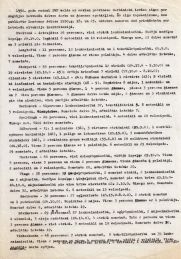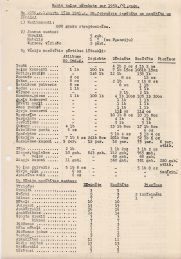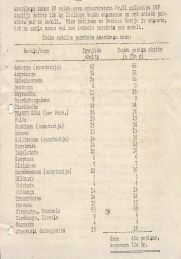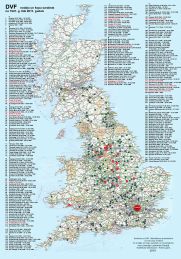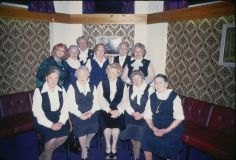In the second half of the 1940s, Britain opened its labour market to Second World War refugees who had been staying in large numbers in displaced persons (DP) camps in Germany. Thus, around 16 000 Latvians came to England within a few years to work in agriculture, coal mines, textile factories, and hospitals. They settled in camps and hostels set up by employers, and immediately started to organise social activities, cultural life and assistance work to support disabled ex-servicemen, old people and orphans left behind in Germany. The Latvian Envoy in London Kārlis Zariņš spoke to Captain Leonīds Uijerts, who had already expanded his activities in helping the arrivals, and invited him to think about the need to set up an organisation to coordinate its assistance work. He discussed this proposal with the former soldiers.
Following communication on 21 December 1947 with Vilis Janums, head of the Daugava Vanagu organisation which had been established in Zedelgem POW camp on 28 December 1945, a meeting was held at the premises of the Latvian Envoy, where the Daugava Vanagu fonds (DVF – known in English as the Latvian Welfare Fund) was established in the UK as an offshoot, also taking over the basic principles of the Statutes of the DV Organisation "to bring together and unite Latvians for the preservation of the community, to strengthen faith in the revival of Latvia, mutual economic and cultural care, human rights and freedom, to fight for free Latvia".
The first chairman of the provisional board of the DVF was Colonel Arvīds Skurbe, one of the initiators of the organisation. The General Meeting of the members of the DVF, convened on 29 February 1948, adopted the statutes drawn up by the Interim Board and elected the Board. Major Aleksandrs Tomass was elected as the first chairman of the Board of the DVF at the 1950 general meeting. Within a couple of years, 263 DVF branches with 5800 members were established. On 20 April 1949, the DVF joined the publisher of the “Londonas Avize” newspaper with a £100 participation fee.
When the initial compulsory employment contracts ended, the exodus to other countries began, or the Latvians moved to cities, purchased personal homes, and established families. At that point the number of branches and members also decreased significantly. However, over time, the number of members increased again, as the DVF, through its activities, gained a great deal of responsiveness in Latvian society. In 1952, the DVF was registered as a care organisation. In order to work successfully, the DVF bought a house in London in 1950, where not only were permanent residents living, but also set up a club and library and meeting rooms . The editorial board of the “Londonas Avize” and the office of the Latvian National Council in Great Britain (LNPL) were also located there. Later, houses were purchased by DVF branches in Bradford, Leeds, Halifax, Coventry, Doncaster, Huddersfield, Bolton and Nottingham, where clubs, libraries and rooms were set up for various self-service groups, as well as organisation events. In 1975, the DVF acquired the rural property Catthorpe Manor (“Straumēni”) where a cultural and elderly care centre was set up. In 2000, DVF released the book "Straumen in England in 25 Years" (“Straumēni Anglijā 25 gados”) edited by Indulis Kažociņš.
Over the years, the DVF has become an important maintainer of Latvian culture and social life. It has held many meetings, celebrated the days of remembrance, regular “Daugavas Vanagu dienas” (DVF Days, since 1962) with lectures, artistic and theatre performances, exhibitions of arts and crafts. The DVF has supported 11 amateur theatre troops, many folk dance groups, several choirs and sports groups. In addition to the work of care and welfare, the DVF devoted its attention to information work, with publications in the British press about Latvia's tragic fate, prepared and distributed material on deportations, the oppression of the people in the homeland, and organised anti-Soviet protest campaigns and demonstrations. No less important was the task of providing compatriots with news in the press about various events, preparing and disseminating circulars, providing regular reports on the activities of the administrative board and documenting the activities of the DVF in photographs and articles. In 1972, the Board of the DVF published a book "25 years of the Daugava Vanagu Fund".
In addition to supporting weekend mother-tongue schools, from 1958, the DVF began to work with Latvian young people to introduce them to their people and homeland, and groups were founded, where folk dances and songs were taught. In this area, cooperation with the Latvian National Council has proved successful, co-organising children's holidays and 3x3 camps. The DVF has always been active in providing moral and material support for Latvian weekend schools. It successfully organised a number of sports, including basketball and volleyball teams. DVF sports teams have also successfully participated in athletics and disabled athletics competitions. As the burden of the years on members became heavier, these sports have been replaced by other sports – novuss, dart throwing, shooting.
In 1986, at the initiative of Jānis Frišvalds, at the DVF provided premises for the Latvian Documentation Centre and Archive, which since 1986 has been managed by Inese Auziņa-Smith. In 1994, the DVF bought a house in Riga and set up a hotel "Radi un Draugi". In 2010, DVF published the book "“Vēl viens sapnis” (Another Dream) – a collection of memories of the author and entrepreneur Adolfs Sīlis, architect Juris Poga, as well as builders and employees, edited by Astrīda Jansone.
As the older generation of exile Latvians passed away (or returned to Latvia) the number of DVF members reduced, several branches in England had to sell their community properties, as well as the hotel "Radi un draugi". In 2020, the DVF owns the London House with a hotel, Catthorpe Manor and DVF Latvian Club in Bradford.
When immigration from Latvia to The United Kingdom increased after Latvia's accession to the European Union, the newcomers stayed aloof for quite a long time and did not participate in the organisations and events of the former exiles. However, communication with the DVF, the LNPL and the congregations gradually developed, with significant involvement. In 2020, the DVF now has nine branches (Bradford, Corby, Coventry, Leicester, Leeds, London, Nottingham, Straumen and Swansea) and two groups (Birmingham and Stockport). As well as the active and lifelong members – 621 members (342 men and 279 women) there are also about 20 associate members who do not pay fees and are not included in the list of active members. Almost all Branch boards, including the regional groups now have half or more members who are new immigrants, which bodes for a hopeful future.
Address by Jānis Frišvalds at the 20th anniversary meeting of the Latvian Welfare Fund Manchester Branch. 7 September 1968.
17th Latvian Welfare Fund reunion, 11‒12 May 1974, Birmingham. Opening remarks by LWF Birmingham Branch chairman Jānis Miezītis. Sound recording by Harijs Blezūrs.
Gunārs Tamsons. OMF23001 – 47. 18.03.97.

